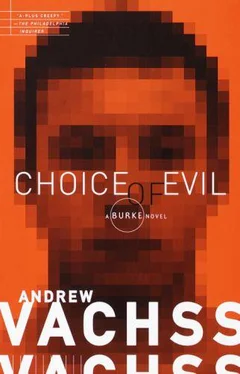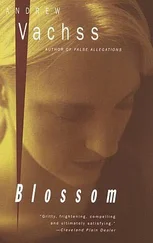But KoKo didn’t cover the Wolf, she twitched her hips and bumped him right off the stage. Then the tape moved on to Albert Collins and Johnny Copeland teaming on “Something to Remember You By,” and I thought of Crystal Beth. . . and what she’d left me with. I was still thinking about that as the tape started to travel through hardcore Chicago, with Son Seals at the wheel, his Bad Blood Blues searing the truth out of that branding iron some fools call a slide guitar. Nadine sat silently through it. Didn’t say one word until I took the Thirty-fourth Street exit from the Drive. “Who was that?” she finally asked.
“Another mix,” I said, thinking she was talking about the stuff at the very end of the tape. “Mostly harp men: Butterfield, Musselwhite, Wilson—”
“Oh, I know him. Kim Wilson, right? From the Fabulous Thunderbirds. But I never heard him play anything like. . .”
“No,” I told her, flat-voiced. “That was Blind Owl Wilson. From Canned Heat. It’s a different planet.”
“Judy Henske’s planet?”
“Yeah.”
“Surprised I remembered?”
“No,” I told her truthfully. “It’s not hard to see you’re a real smart girl.”
“And that’s good, right?”
“No. It just. . . is. A good mind’s like any piece of technology. Neutral. Like a gun or a knife. It’s not what you have, it’s what you use it for.”
“That’s another way of saying you don’t trust me?”
“How many more ways would you like?”
“There’s a spot,” she said, pointing with a transparent-lacquered fingernail at a Mercedes pulling away from the curb. I parallel-parked, thinking of what Wolfe’s Audi would have done to the pristine BMW behind me, and we got out. Once I saw her building, I could see rent control wasn’t an issue—it was a major-league high-rise, built within the past few years.
Nadine smiled at the doorman’s “Good evening,” but didn’t say anything back. We got on the elevator.
“Go ahead,” she said, nodding toward the row of push-buttons. “I’m sure you know which floor’s mine.”
“Nope.”
She snorted. Tapped the 44 button.
When the elevator stopped, she stepped out ahead of me. I followed her down the heavy-carpeted hall. The plain pumps had enough heel to keep her mass in motion, so I couldn’t tell if it was inertia or she was putting on another show.
When she got to 44J, she inserted the key she must have palmed when I was watching the mass in motion, and then we were inside.
“Careful,” she said, showing me what she meant by moving slowly down a couple of steps into a sunken living room. She hit a wall switch and a soft rosy light suffused the entire room. It was long and narrow, with the far wall almost floor-to-ceiling glass, flanked on each side by a black acoustical tower. On the right, an audiophile extravaganza spread across a single shelf that flowed out of the wall so smoothly it must have been a custom job. Along the left, the major focal point was one of those giant-screen TV units with a trio of leather recliners and matching ottomans—one black, one white, and one red—arranged with their backs to the right-hand wall.
“I’m not out at work,” she said, as if that explained the decor. “Have a seat.”
The window glass looked fixed in place—they don’t have balconies that high up—so I took the chair closest to it, the white one, spun it so it was facing the door.
Nadine walked over to where I was sitting, pulled the ottoman away, and perched on it, crossing her legs again. “Open it yourself,” she said, indicating the briefcase on the floor. “It’s not locked.”
I popped the small brass latches at each end. Inside, nothing but paper. Photocopies. Crime-scene reports. Even down to the photographs. Maybe a couple of hundred pages in all. I started to leaf through them, asking, “Is this—?”
“Just one case,” she interrupted. “My. . . friend says she didn’t know what the. . . I mean, she did know what you meant—the ‘polygraph-key’ thing—but she didn’t know which ones they would use. She said ninety percent of this stuff never made the papers, so they had a lot to choose from. And it isn’t her case, so. . .”
“Ssshh,” I said, reading.
Even in the soft-rose lighting, it was easy enough to figure out which of the cases it was. The best one for polygraph keys—one of the first ones—the guy who’d gotten the ice pick in the spine. A blown-up car wouldn’t give away much. Oh sure, if the lab guys were good enough, they might find the triggering device. . . or a clue to it, anyway. Maybe even tell you the type of explosive. But there’s nothing like a face-to-face homicide to produce a crime scene you can vacuum all to hell.
And they had. I finally found exactly what I was looking for. The ice pick the newspapers had reported hadn’t been one at all. The weapon had been a ninja spike of some kind, a triangular piece of tempered steel with notches for finger grips at the thick end. On the top, where it was the thickest, there was an engraved icon, inset in red. I knew the color only because someone had written the word “red” with an arrow pointing toward it on the photocopy. I guess either the Department didn’t have color copiers or, more likely, Nadine’s playmate didn’t have access to one.
“Have you got a—?”
I looked up and realized I was talking to an empty space. Nadine had gone somewhere. I glanced at my watch. I’d been in that chair for almost two hours. I guess I’d gone somewhere too.
The apartment was sealed-off quiet, no street noises penetrating the thick glass, the rich gray carpet muffling anything else. Where was she? There had to be at least a bedroom and a kitchen. Bathroom too. But I didn’t want to start cruising around. And everything past the circle of rosy light I had been reading by was a pool of blackness.
“Nadine?” I called out, medium-voiced, pitched to carry past the living room, no more.
No answer.
It didn’t stink like a trap does. And the decor wasn’t a clue either. You walk into a room where everything’s covered in plastic, floor to ceiling, you better start shooting before they go to work with the baseball bats. But this. . .?
Nadine was a girl who loved her games. I could walk out and take the papers with me. Or get up and look through the other rooms.
I didn’t like the choices, so I pulled the cellular out of my pocket and dialed her number. I heard it ring, somewhere back through the walls. If there was a phone in the living room, I couldn’t see it. Or hear it.
She had it by the second ring, her voice awake and sharp even though it was almost two in the morning. But some people wake up just like that, so I couldn’t tell.
“Hello?”
“You mind taking a little walk?” I asked.
“Oh! It’s. . . sure. Just give me a minute.”
I wanted a smoke, but I didn’t even think about going through with it. There wasn’t an ashtray in sight. And one of those air-filtering canisters sat in a far corner whispering its work.
Then she seemed to just materialize out of the side of the wall. Nude.
“I was asleep,” she said, as calmly as if we were talking inside an office. “You were so. . . absorbed, I didn’t want to disturb you.”
“I didn’t want to disturb you, ” I told her. “And I didn’t want to. . . invade your privacy.”
My eyes never left hers. Still cobalt, hers were. So either she was lying about being asleep or they weren’t contacts like I’d first thought.
“That was very considerate,” she said, calmly. “Are you all finished?”
“Not quite yet. Have you got a magnifying glass of some kind? And a better light I could use for a minute?”
“Sure,” she said, spinning on her heel and disappearing again.
Читать дальше











